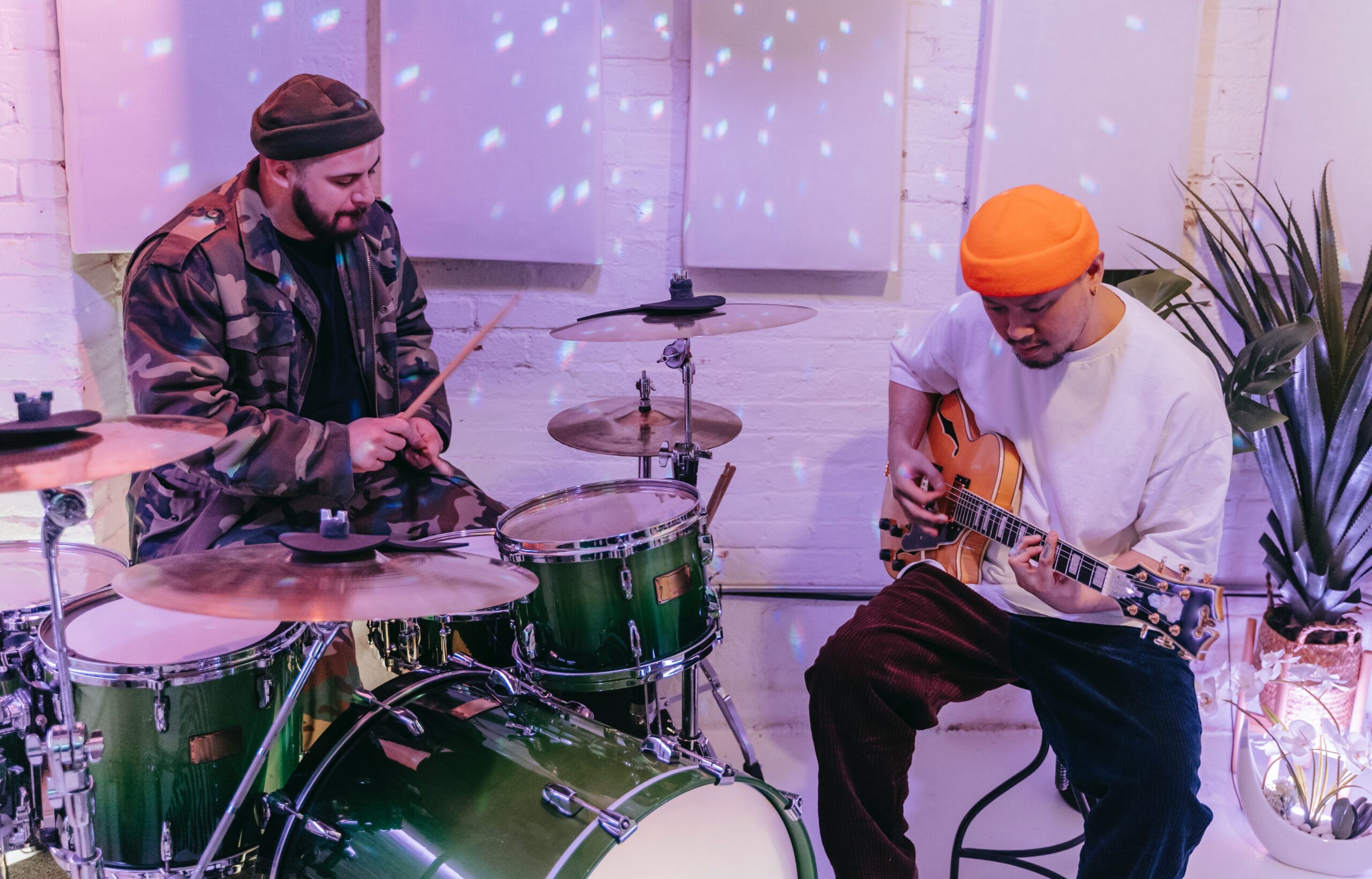Introduction
In the whirlwind of the music industry, where the pursuit of artistic expression collides with the demands of success, self-care often takes a backseat.
However, recognizing and prioritizing self-care is crucial for musicians’ overall well-being, creativity, and longevity in the industry.
In this blog post, we will explore the unique challenges faced by musicians, delve into the physical and mental benefits of self-care, discuss the balance between work and personal life, and draw insight and examples from popular music and hip-hop.
Understanding the Unique Challenges Faced by Musicians
Musicians face a myriad of challenges that can impact their well-being. The demanding nature of their careers, including performances, touring, and studio sessions, takes a toll on their physical and mental health.
The pressure to meet expectations and achieve success can lead to stress, burnout, and even substance abuse.
For example, many popular musicians and hip-hop artists, such as Amy Winehouse and Mac Miller, have tragically succumbed to the pressures of the industry, highlighting the need for self-care and support.
The music industry is a dynamic and often unforgiving landscape that presents musicians with a set of unique challenges. To truly appreciate the importance of self-care for musicians, it is crucial to explore and understand the nature of these challenges.
Firstly, the demanding nature of a musician’s career places significant physical and mental strain on their well-being.
From extensive touring schedules to late-night performances, musicians often face irregular sleep patterns, long hours of rehearsals, and the physical exertion of live shows. These factors can lead to fatigue, exhaustion, and even physical injuries.
Additionally, the pressure to consistently deliver exceptional performances, meet deadlines, and fulfill the expectations of fans, labels, and industry professionals can contribute to high levels of stress and anxiety.

In the realm of popular music and hip-hop, the intensity of the spotlight can further amplify these challenges. The constant scrutiny from the media and the public eye can place immense pressure on musicians to maintain a certain image or meet unrealistic standards.
This pressure can lead to self-doubt, identity crises, and a distorted sense of self-worth.
Artists like Justin Bieber and Kanye West have spoken openly about their struggles with fame and the toll it has taken on their mental health, highlighting the need for self-care amidst the pressures of stardom.
Moreover, the music industry is known for its competitiveness and unpredictable nature. The journey to success is often paved with rejection, setbacks, and a constant need to prove oneself.
Musicians face numerous hurdles, including difficulty securing record deals, gaining airplay on radio stations, or capturing the attention of influential industry figures. Rejection can be disheartening and emotionally draining, testing the resilience and determination of musicians.
Developing coping mechanisms and practicing self-care is crucial for preserving mental and emotional well-being in the face of such challenges.
Furthermore, the prevalence of substance abuse within the music industry cannot be ignored. The allure of parties, after-parties, and late-night events can create an environment that encourages excessive drinking, drug use, and unhealthy coping mechanisms.
While popular music and hip-hop have had their fair share of artists battling addiction, such as Eminem and Mac Miller, it is essential to emphasize the importance of self-care as a healthier alternative to address the underlying issues that contribute to substance abuse.
Recognizing these challenges and their impact on musicians’ well-being underscores the critical need for self-care. It is not only about preserving physical and mental health but also about cultivating a sustainable and fulfilling career in music.
When prioritizing self-care, musicians can equip themselves with the tools and resilience necessary to navigate the industry’s demands while maintaining a sense of balance, purpose, and creativity.
The Physical Benefits of Self-Care for Musicians
Physical well-being plays a vital role in musicians’ performances. Regular exercise, such as cardio and strength training, improves stamina, breath control, and overall energy levels.
Adequate nutrition provides the necessary fuel for sustained artistic expression.
Additionally, prioritizing rest and ensuring sufficient sleep rejuvenates both the body and mind. Artists like Beyoncé and J. Cole have emphasized the importance of physical health by sharing their fitness routines and promoting a healthy lifestyle.
The physical benefits of self-care for musicians extend beyond improving performance stamina and energy levels.
Engaging in regular exercise not only enhances physical fitness but also releases endorphins, promoting a positive mood and reducing stress.
Adequate nutrition, including a balanced diet and proper hydration, provides the essential nutrients necessary for musicians to sustain their energy, support their immune systems, and recover from demanding schedules.
With good rest and sleep, musicians allow their bodies to recharge, reducing the risk of burnout and enhancing their overall well-being.
The Mental and Emotional Benefits of Self-Care for Musicians
The music industry is not immune to mental health challenges. Musicians often experience high levels of stress, anxiety, and depression.
Self-care practices, such as therapy, meditation, and mindfulness, can help manage these issues.
Hip-hop artist Logic has openly discussed his struggles with mental health, helping to reduce stigma and promote seeking support. By incorporating self-care into their routines, musicians can maintain emotional well-being and sustain their passion for music.
Check out: Inside Logic’s “1-800-273-8255” Suicide Prevention Song | Mental Health Awareness Month
The mental and emotional benefits of self-care for musicians are profound. Engaging in therapy or counseling can provide a safe space for musicians to explore their emotions, process challenges, and develop coping strategies.
Incorporating mindfulness and meditation practices into their routines can help musicians cultivate self-awareness, manage stress, and find moments of calm amidst the chaos.
When prioritizing their mental and emotional well-being, musicians can create a solid foundation for their artistic expression, leading to greater authenticity and connection with their audience.
Balancing Work and Personal Life through Self-Care
Musicians often face difficulties in striking a healthy work-life balance. The industry demands constant dedication and long hours, leaving little time for personal life and self-care.
However, setting boundaries and prioritizing self-care is essential for sustained success and happiness. Artists like Rihanna and Kendrick Lamar exemplify the importance of maintaining personal time and pursuing non-musical interests.
By finding joy outside of their careers, musicians can replenish their creative energies and find renewed inspiration.
Building Resilience and Coping with Rejection
The music industry is highly competitive, with countless aspiring artists vying for recognition. Rejection and setbacks are an inevitable part of this journey.
Self-care plays a crucial role in building resilience and managing these challenges.
Engaging in activities like journaling, practicing gratitude, and surrounding oneself with a supportive network can help musicians navigate through disappointments.
Taylor Swift and Jay-Z have faced rejection but emerged stronger, highlighting the importance of self-care in the face of adversity.
Building resilience and coping with rejection is an essential aspect of self-care for musicians. It involves developing a growth mindset that allows artists to view setbacks as opportunities for growth and learning.
By practicing self-compassion and reframing negative experiences, musicians can bounce back stronger and continue pursuing their artistic goals.
Seeking support from fellow musicians, mentors, and mental health professionals can provide valuable guidance and encouragement during challenging times, fostering resilience and helping musicians navigate the ups and downs of the industry.
Check out: Overcoming Performance Anxiety as a Musician
Nurturing Creativity and Inspiration through Self-Care
Creativity is the lifeblood of music, and self-care serves as a nurturing force for artistic inspiration. Taking time for self-reflection, engaging in hobbies, and seeking new experiences can reignite creative sparks.
Adele and Kanye West have spoken about finding inspiration through introspection and exploring diverse influences.
When prioritizing self-care, musicians can cultivate their unique voices and evolve their artistry.
Nurturing creativity and inspiration through self-care is a transformative process that allows musicians to tap into their artistic depths.
Engaging in self-care practices, such as taking walks in nature, journaling, or practicing mindfulness, provides moments of reflection and introspection that fuel the creative process.
Exploring diverse influences, whether it be through reading, attending concerts, or immersing in different genres, broadens musical horizons and invites fresh perspectives.
By intentionally making space for self-care, musicians create an environment that fosters curiosity, experimentation, and the freedom to explore their unique creative visions.
Self-Care for Vocalists and Instrumentalists
Vocalists and instrumentalists have specific self-care considerations. Vocalists must prioritize vocal warm-ups, maintain hydration, and practice proper techniques to prevent strain and injury.
Instrumentalists need to pay attention to posture, ergonomics, and regular breaks to avoid repetitive stress injuries.
Ariana Grande and John Mayer have shared their vocal and instrumental warm-up routines, emphasizing the importance of physical self-care for optimal performance and longevity.
Self-care for vocalists and instrumentalists involves specific considerations to maintain their physical well-being and preserve their artistic abilities.
Vocalists should prioritize vocal warm-ups, which include exercises to strengthen and maintain vocal range, as well as techniques to improve breath control and reduce strain.
Instrumentalists, on the other hand, need to focus on maintaining proper posture and technique to prevent injuries, such as repetitive strain injuries, that can impact their ability to play their instruments.
By incorporating these self-care practices into their routines, vocalists, and instrumentalists can enhance their performance longevity and ensure the longevity of their musical careers.
Seeking Support and Connection within the Music Community
Self-care doesn’t mean navigating challenges alone. Seeking support within the music community can provide a sense of belonging, understanding, and shared experiences.
Musicians can connect with fellow artists, mentors, and organizations that promote well-being in the industry. The music community has witnessed initiatives like MusiCares and organizations such as Hope for the Day that prioritizes mental health support for musicians.
Chance the Rapper and SZA have actively supported mental health organizations, raising awareness and fostering a culture of support.
Check out: Developing Stage Presence as a Performer
Conclusion
In the competitive and demanding world of music, self-care should not be overlooked or undervalued. By recognizing and prioritizing self-care, musicians can nurture their well-being, enhance their creativity, and sustain their passion for music.
Drawing inspiration from popular music and hip-hop, we have explored the unique challenges faced by musicians and the importance of physical and mental self-care.
Let us remember that self-care is not a luxury but a necessity for musicians to thrive and continue sharing their melodic gifts with the world.
By embracing self-care as an integral part of their journey, musicians can not only nurture their well-being but also create a positive ripple effect, inspiring others within the music industry to prioritize their own self-care and ultimately contribute to a healthier, more sustainable creative environment.






